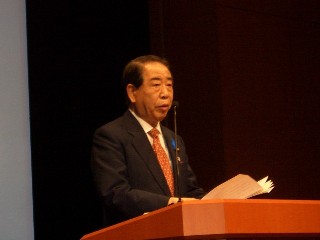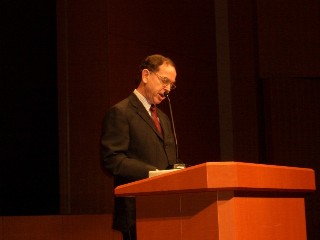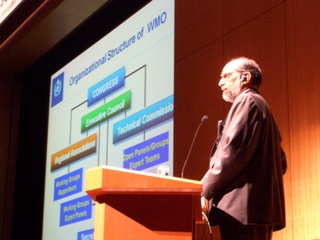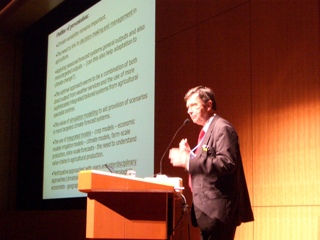The Japan Meteorological Agency (JMA) held the Tokyo Climate Conference: Better Climate Information for a Safe and Sustainable Society in Tokyo, Japan, from 6 to 8 July 2009, under the auspices of World Meteorological Agency, Government of Japan (Ministry of Foreign Affairs of Japan, Ministry of Education, Culture, Sports, Science and Technology, Ministry of Agriculture, Forestry and Fisheries, Ministry of Economy, Trade and Industry, Ministry of the Environment) and Japan International Cooperation Agency. .
Over 70 prominent scientist and experts participated in this conference, including representatives from National Meteorological and Hydrological Services (NMHSs) and user organizations of climate information in 24 Asia-Pacific countries and 8 relevant international organizations.
The discussions were made to facilitate the provision and application of user-oriented climate information through the enhanced collaboration between climate service providers and users.
In order to raise social awareness of climate information usage, a public symposium was held on 8 July, .
The results of the discussion was formulated and adopted as the Conference Statement.
This statement is expected to contribute, as inputs from the region, to World Climate Conference-3 (WCC-3) to be held in Geneva, Switzerland, from 31 August to 4 September 2009.

Program
| Monday, 6 July 2009 | |
| Morning Session | Opening ceremony |
| | Keynote lectures |
| | Regional climate information: RCC and RCOF |
| Afternoon Session | Best practices of climate information utilization in socio-economic sectors |
| | International cooperation on climate-related issues |
|
|
| Tuesday, 7 July 2009 | |
| Morning Session | Sectoral discussion (1): Agriculture |
| | Sectoral discussion (2): Water resource/hazard management |
| Afternoon Session | Sectoral discussion (3): Regional cooperation |
| | Introduction to the draft Conference Statement and discussions |
|
|
| Wednesday, 8 July 2009 | |
| Morning Session | Public symposium |
| Afternoon Session | Approval of Conference Statement |
The Conference Statement
Tokyo Climate Conference aimed to enhance collaboration toward establishment of a new international framework for climate service.
Participants shared views of the current status and challenges as follows:
- In Asia-Pacific region, where climate and its predictability differ from region to region and social and cultural background vary from country to country, it is necessary to take into account these difference and variation in climate information services and applications.
- In order to promote the application of climate information, improvement of forecast and monitoring accuracy is indispensable. In addition to technical development by NMHSs by themselves, use of supporting information provided by Global Producing Center for Long-range Forecasts (GPC) and Regional Climate Centers (RCCs) can make NMHSs possible to produce and provide new useful climate information.
- Beijing Climate Center and Tokyo Climate Center were recently designated as the first WMO RCCs, in recognition of their contribution to improving the capabilities of NMHSs' climate services in Asian region.
Based on this recognition, the participants agreed to recommend the following actions to the relevant bodies.
- NMHSs are urged to play a major role in continuously providing operational climate service to meet national needs, taking into account social and cultural background of the nation.
- Users and potential users in the climate sensitive sectors are encouraged to contact with NMHSs, obtain climate information and communicate to NMHSs their requirements regarding the provision of climate information.
- RCCs are urged to make efforts to further support the capacity building of NMHSs based on their requirements and requested to periodically organize Regional Climate Outlook Forum in order to promote the application of climate information tailored to the users' circumstances and requirements.
The whole text of the Conference Statement is available below.
the Conference Statement (PDF, 41KB)
Public Symposium
In order to raise social awareness of climate information usage, a public symposium was held on 8 July.
In the opening, Mr Tokio Kanou, Senior Vice-Minister of the Ministry of Land, Infrastructure, Transportation and Tourism gave an opening address and His Excellency Mr. Paul Fivat, Ambassador of Switzerland to Japan made short a speech representing the host country of WCC-3.
Dr. Avinash Tyagi, Director of Climate and Water Department at WMO, introduced the objectives and expected outcomes of WCC-3.
Ms. Sae Nakarai, famous weather broadcaster, talked about her efforts to provide intuitive and clear-cut weather/climate information on TV program.
Professor Roger Stone at the University of Southern Queensland introduced the successful examples of the utilization of seasonal forecast and El Ni?o outlook in the agriculture sector in Australia.
Dr. Masahide Kimoto, Deputy Director and Professor of Center for Climate System Research, University of Tokyo, illustrated the increased utility of climate information in association with the development of computer model of climate.
More than 400 audiences participated in this symposium.
 |
Mr Tokio Kanou, Senior Vice-Minister of the Ministry of Land, Infrastructure, Transportation and Tourism gave an opening address in the public symposium.
(8 July 2009) |
 |
His Excellency Mr. Paul Fivat, Ambassador of Switzerland to Japan made a short speech representing the host country of WCC-3.
(8 July 2009) |
 |
Dr. Avinash Tyagi introduced WCC-3.
(8 July 2009) |
 |
Dr. Roger Stone introduced the successful examples of the utilization of seasonal forecast and El Niño outlook in the agriculture sector in Australia.
(8 July 2009) |
|
